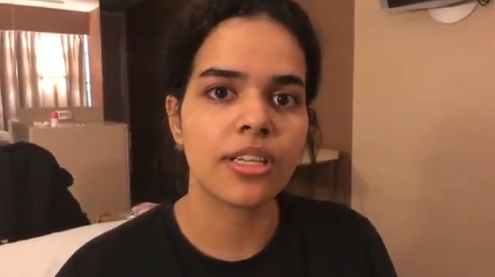
A young Saudi woman who says she has fled her family in fear for her life has barricaded herself in her hotel room at Bangkok airport.
Thai immigration officials have tried to return Rahaf Mohammed al-Qunun, 18, to Kuwait, where her family is.
She refused to board a flight to Kuwait City on Monday, despite officials stationed outside her room.
“My brothers and family and the Saudi embassy will be waiting for me in Kuwait,” the teenager told Reuters.
“They will kill me. My life is in danger. My family threatens to kill me for the most trivial things.”
Rights groups including Human Rights Watch have expressed grave concerns over Ms Mohammed al-Qunun’s welfare.
“She has barricaded herself in the room and says she will not leave” until she is allowed to meet the UN refugee agency and claim asylum, Human Rights Watch’s deputy Asia director Phil Robertson said on Twitter.

Just after 16:00 local time on Monday (09:00GMT), Thailand’s chief of immigration police Surachate Hakparn told reporters that plans to expel Ms Mohammed al-Qunun had been reversed due to concerns for her safety.
“If deporting her would result in her death, we definitely wouldn’t want to do that,” he said, according to Thai news website Khaosod English.
He said he would meet the UNHCR, the United Nations’ refugee agency, later on Monday to discuss the case.
An injunction filed by Thai lawyers in Bangkok criminal court to stop the deportation was dismissed earlier on Monday.
The BBC’s Jonathan Head, who is in a hotel room on the floor above Ms Mohammed al-Qunun, says Thai immigration officials are outside her room and now say they want to negotiate with her.
Thailand is not a signatory to the UN Refugee Convention, and provides no legal protection to asylum-seekers – although there are more than 100,000 refugees in the country.

How did the stand-off start?
Ms Mohammed al-Qunun was on holiday with her family in Kuwait when she fled on Saturday. She was trying to reach Australia, where she hoped to seek asylum, via a connecting flight in Bangkok.
She says her passport was seized by a Saudi diplomat who met her coming off the flight at Suvarnabhumi airport on Sunday.
Thailand says she is being deported because she does not have the requirements for a Thai visa. However, she insists she has a visa for Australia, and never wanted to stay in Thailand.
The Saudi embassy in Bangkok said Ms Mohammed al-Qunun is set to be deported to Kuwait “where most of her family lives”.
It said Saudi Arabia does not have the authority to hold her at the airport or anywhere else, and that officials are in touch with her father.
Mr Robertson of Human Rights Watch told the BBC: “It seems that the Thai government is manufacturing a story that she tried to apply for a visa and it was denied… in fact, she had an onward ticket to go to Australia, she didn’t want to enter Thailand in the first place.”
He argued that the Thai authorities had clearly co-operated with Saudi Arabia, as Saudi officials were able to meet the plane when it arrived.
How was the world alerted?
Ms Mohammed al-Qunun started attracting attention with her social media posts over the weekend. She has also given a friend access to her Twitter account, calling it a contingency in case anything should happen to her.
She told BBC Newshour she was in a hotel in the transit area.
“I shared my story and my pictures on social media and my father is so angry because I did this… I can’t study and work in my country, so I want to be free and study and work as I want,” she said.
Women in Saudi Arabia are subject to male guardianship laws, which mean they need a male relative’s permission to work, travel, marry, open a bank account, or even leave prison.
Ms Mohammed al-Qunun wrote on Twitter that she had decided to share her name and details because she had “nothing to lose” now.
She has asked for asylum from governments around the world.

A photo appeared of her in her room as officials reportedly stood outside, waiting to put her on a flight back to Kuwait.

Thai Police Major General Surachate Hakparn told the BBC that Ms Mohammed al-Qunun was escaping a marriage, and called the case a “family problem”.
Why are there fears for her welfare?
Ms Mohammed al-Qunun told the BBC that she had renounced Islam, and feared her family would kill her if she was sent back to Saudi Arabia.
She explained to the New York Times: “They will kill me because I fled and because I announced my atheism. They wanted me to pray and to wear a veil, and I didn’t want to.”
Freedom of religion is not legally protected in the Islamic kingdom, and people who convert to another religion from Islam risk being charged with apostasy – or abandoning their religious beliefs.
The crime is legally punishable by death – although courts have not carried out a death sentence in recent years.
Alternatively, Ms Mohammed al-Qunun could be charged with “terrorism”. Saudi Arabia’s counter-terrorism law and a series of related decrees are used to criminalize a wide range of acts, including insulting the country’s reputation, harming public order, and “calling for atheist thought in any form”.
An adult woman who does not heed her guardian can also be arrested on charges of “disobedience”. If a woman is detained for any reason, the police will not release her unless her guardian comes to pick her up, even if she faces no criminal charges.
Award-winning activist Samar Badawi sought refuge in a women’s shelter in 2008, alleging that her father had beaten and abused her. When her father filed a lawsuit, she was arrested and spent seven months in jail on the charge of “parental disobedience”.
Mariam al-Otaibi, another activist, spent 104 days in jail in 2017 after her father had her arrested on charges of “disobedience”.
Michael Page, deputy Middle East director at Human Rights Watch, said Saudi women fleeing their families can face “severe violence from relatives, deprivation of liberty, and other serious harm if returned against their will”.
The case echoes that of another Saudi woman who was in transit to Australia in April 2017.
Dina Ali Lasloom, 24, was en route from Kuwait via the Philippines but was taken back to Saudi Arabia from Manila airport by her family.
She used a Canadian tourist’s phone to send a message, a video of which was posted to Twitter, saying her family would kill her.
Her fate on arriving back in Saudi Arabia remains unknown.
Source: bbc.co.uk







Be the first to comment